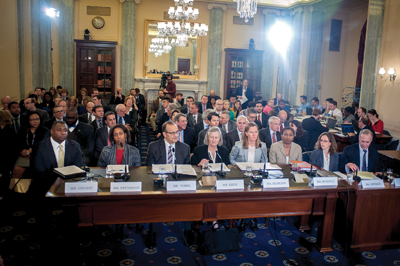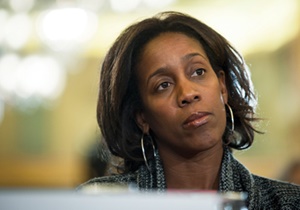NFL owners meet Wednesday as they close in on approving a reformed personal conduct policy for players in the wake of the Ray Rice and Adrian Peterson domestic violence scandals.
Legal experts warn, however, that if the league, as planned, pushes a new policy through without collectively bargaining the changes, the NFL Players Association would have solid grounds to either bring a grievance to the National Labor Relations Board or to seek an injunction.
“I am not sure what the NFL is thinking,” said William Gould, the former chairman of the NLRB and now a professor of labor law at Stanford. Gould also is currently chairman of the California Agricultural Labor Relations Board.
The NFL is seeking to change a provision of the 2011 collective-bargaining agreement, and that’s an action on which the NFLPA must agree, Gould said. If the NFL unilaterally imposes a new policy that changes the CBA language, the union’s remedies are either an NLRB grievance or neutral arbitration combined with a motion in a federal court for an injunction, Gould said.
The section of the CBA that’s at issue specifically is Article 46, which gives the commissioner his power over player misconduct.
 |
At a Senate hearing on domestic violence in sports last week were the NFL’s Troy Vincent, the NFLPA’s Teri Patterson, MLB’s Joe Torre, the MLBPA’s Virginia Seitz, the NBA’s Kathleen Behrens, the NBPA’s Michele Roberts, the NHL’s Jessica Berman and the NHLPA’s Steve Fehr.
Photo by: GETTY IMAGES
|
The NFLPA since October has demanded that the league engage in collective bargaining over the planned policy changes. The union did not reply for comment about how it would respond to any new policy that ignored its consent.
But last week, in a statement made before a U.S. Senate Commerce Committee hearing on domestic violence and sports, NFLPA deputy managing director Teri Patterson said, “The NFL still refuses to commit to collective bargaining. We believe that a jointly bargained system is the only way to ensure that professional football’s approach to the issue of domestic violence has the credibility and effectiveness the fans, the sport’s business partners, and our players have come to expect.”
The league has insisted that while it wants input from the NFLPA, collective bargaining is not in the cards. NFL general counsel Jeff Pash, in a Nov. 30 letter he sent to the union, wrote, “We are prepared, as we have previously advised, to discuss modifying Article 46 to provide that the initial disciplinary decision would be made by someone other than the Commissioner or his designee. We would be prepared to consult with the NFLPA on the identity of such a disciplinary officer. Any appeal would continue to be to the Commissioner or his designee, as currently provided for in Article 46.”
 |
Teri Patterson, NFLPA deputy managing director
Photo by: GETTY IMAGES
|
The league is thus offering to change how disputes are heard, removing the commissioner as the first to hear a case, as is currently the case. The NFLPA wants to invert that proposal — so the commissioner hears the first round, but a neutral arbitrator would hear any appeal.
Catherine Fisk, a professor at the University of California, Irvine, School of Law, said player suspensions are a subject of mandatory collective bargaining as she interprets labor law. While the league might argue the changes it is seeking fall under the discretion afforded the commissioner in Article 46, Fisk said, “If [NFL Commissioner Roger Goodell] wants to change the process, he has to change the CBA.”
Irwin Kishner, a sports attorney at Herrick, Feinstein, where he represents teams and leagues, agreed the league is on thin ice legally arguing that player conduct policy changes are not subject to union agreement.
“I haven’t seen a legal argument to justify it,” he said. “Their intentions are right on all of this, but I don’t see how they can unilaterally implement a change to an article in the CBA.”
Theoretically, the NFL could leave the current dispute-resolution process in place — so the commissioner still punishes the player and hears any appeal, or designates someone to do so. Then, any new punishment protocols, such as heavier suspensions for domestic violence incidents, could in theory fall under the discretion afforded in Article 46 already.
But whether Goodell politically can keep his powers to oversee all disputes is another matter. An arbitrator’s decision Nov. 28 to overturn Rice’s indefinite suspension found the commissioner had made an “arbitrary” decision. Said Patterson, speaking to the senators last week, “We have seen on more than one occasion when disciplinary matters are left solely to the NFL, the process is mismanaged, and often the end result has not been able to withstand outside review.”
The NFLPA, of course, might have its own political issues if it seeks to stop a new policy on player conduct unveiled by the league. Senators at the hearing grilled union representatives across sports about whether they cared about the due-process rights of their players more than domestic violence. Sen. Kelly Ayotte (R-N.H.) described as “disgusting” comments made by National Basketball Players Association Executive Director Michele Roberts, who previously had called the 24-game suspension the NBA imposed on Jeffrey Taylor for domestic violence excessive. Roberts replied she was defending the due-process rights of her players.
Similarly, Sen. Dean Heller (R-Nev.) vigorously pressed Patterson on whether she thought players’ rights to due process were more important than domestic violence. Patterson ultimately said domestic violence trumped due process. Sen. Jay Rockefeller (D-W.Va.), chairman of the committee, then commended Heller for his line of questioning.
Goodell said in September he expects to have a new policy on player conduct in place by the Super Bowl. Troy Vincent, executive vice president of football operations for the NFL, said at the Senate hearings last week that a new policy might be ready in a few weeks.





